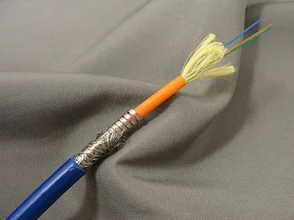 There are as many varieties of wire and cable insulation as there are wires and cables. Insulation is an important non-conductive material that surrounds and protects the individual wires or cables that make up a cable assembly. Some wire insulation is produced to resist electric current in electrical applications. Other types of insulation are used in dielectric applications for radio frequency cables. Insulation further prevents current from contact with other conductors, resists electrical leakage and offers protection from all environmental conditions. Depending on the application, insulation generally is from plastic, fluoropolymers or rubber materials.
There are as many varieties of wire and cable insulation as there are wires and cables. Insulation is an important non-conductive material that surrounds and protects the individual wires or cables that make up a cable assembly. Some wire insulation is produced to resist electric current in electrical applications. Other types of insulation are used in dielectric applications for radio frequency cables. Insulation further prevents current from contact with other conductors, resists electrical leakage and offers protection from all environmental conditions. Depending on the application, insulation generally is from plastic, fluoropolymers or rubber materials.
Different Types of Insulation:
Plastic
Polyvinyl Chloride (PVC) is known for its diverse applications. With a temperature range between -55°C and 105°C, it is flame, moisture, and abrasion resistant. Its applications are compatible with gasoline, ozone, acids, and solvents, and it is safe for medical and food related purposes as it is odorless, tasteless, and non-toxic.
Semi-Rigid PVC (SR-PVC) is used as a primary insulation where very abrasive resistance is required. As well as being flame retardant, semi-rigid PVC also resists heat, water, acid, and alkali.
Plenum Polyvinyl Chloride (Plenum PVC) is another type of PVC wire insulation material. Applications are suited for interiors in spaces beneath raised floors of above dropped ceilings or raised floors, primarily areas with air circulation.
Polyethylene (PE) is a dense, inflexible material that is used mostly for insulating coaxial and low capacitance cables. Though flammable, it carries exemplary electric qualities, can reduce the dielectric constant, and is a very good option for cables requiring high-speed transmission. With cross-linking, polyethylene properties can produce high resistance to cracking, cut-through, soldering, and solvents. Its temperature range is -65°C to 80°C.
Polypropylene (PP); with properties similar to polyethylene, with a temperature range of 30°C to 80°C, this wire material is used in interiors, primarily within thin walls.
Polyurethane (PUR) has an exceptional temperature range (-62°C to 93°C), is tough and flexible with a very good flex life. Resistant to chemicals, water, and abrasion, it works well in retractile cord applications, as well as in marine and low-temperature environments.
Chlorinated Polyethylene (CPE); with very good heat, oil, and weather resistance, this insulation is commonly found in power and control cable applications, industrial power plant applications, and CPE cable insulation displays.
Nylon is known for its flexibility and abrasion, cut-through, and chemical resistant properties. As an application, it is usually extruded over softer insulation compounds.
Rubber
Rubber refers to both natural rubber (NR) and synthetic SBR compounds. Though this material has poor oil and ozone resistance, it has good low-temperature flexibility, offers good water and alcohol resistance, electrical properties and excellent abrasion resistance.
Thermoplastic Rubber (TPR) is used in applications that require higher processing speeds and a wider usable temperature range. It has excellent heat, weather and age resistance but limited cut-through resistance.
Neoprene (Polychloroprene) is a thermoset rubber with exceptional abrasion, cut-through, oil and solvent resistance. Neoprene has a long service life, wide temperature range, is flame retardant and self-extinguishing.
Styrene Butadiene Rubber (SBR) is another thermoset rubber with similar properties as neoprene. With a temperature range of -50°C to 90°C, SBR is used primarily in Mil-C-55668 cables.
Silicone is a versatile synthetic rubber known for its high heat-resistant and flame-retardant properties (180°C). It is extremely flexible with average abrasion-resistance, and is ideal with many electrical applications.
Fiberglass is the most widely used glass insulation. With continuous working temperatures up to 482°C, the material has very good moisture and chemical resistance, but low abrasion resistance. It’s commonly used in applications for heat treating, glass and ceramic kilns, foundries and aluminum processing.
Ethylene Propylene Rubber (EPR) has excellent thermal and electrical properties, and is commonly used in high-voltage cables. The material is soft and flexible, and offers very good resistance to heat, oxidation, weathering, water, acid, alcohol and alkali. It also has an operating temperature range of -50°C to 160°C. Due to its softness and flexibility, it should be handled with care during installation.
Chlorosulfonated Polyethylene (CSPE) (aka Hypalon) provides low-voltage insulation. It has chemical and UV resistant properties, works in a wide temperature range, and is found in appliance wire, lead wire, coil leads, transformer leads and motor lead wire.
Ethylene Propylene Diene Monomer (EPDM) offers excellent heat, ozone, weather, and abrasion resistance. It has excellent electrical properties, good dielectric strength, and retains excellent flexibility in temperature application ranges from -55°C to 150°C.
Fluoropolymer
PFA; with a temperature ratings range of -65°C to 250°C, PFA is suitable for high and low temperature applications. It has superior mechanical strength, and its very low dissipation factor makes it an electrically efficient option. PFA is an expensive material.
Polytetrafluoroethylene (PTFE) is an extremely flexible, and water, oil, chemical, and heat resistant thermoplastic material. Its applications service a wide temperature range of -73°C to 204°C.
Fluorinated Ethylene Propylene (FEP) is a highly flame-resistant material. When foamed, it improves data transmission, which also improves pricing and processing. It is commonly used in plenum cable and military applications.
ETFE and ECTFE Halar materials offer more strength and flexibility than PFA or FEP and, when irradiated, can become thermoset. Foaming the material reduces weight and improves data transmission. However, the materials lack the electrical advantages offered by FEP.
Polyvinylidene Fluoride (PVDF) (aka Kynar) is a flexible, lightweight and thermally stable insulation material with chemical, heat, weather, abrasion, and fire resistant properties. Its relatively low-cost makes it an insulation option for a wide range of industries and applications. Its UL standard 910 Plenum Cable Flame Test rating deem it suitable for application in a building space requiring air circulation necessary for dropped ceilings or raised floors.


